Raccoon Removal

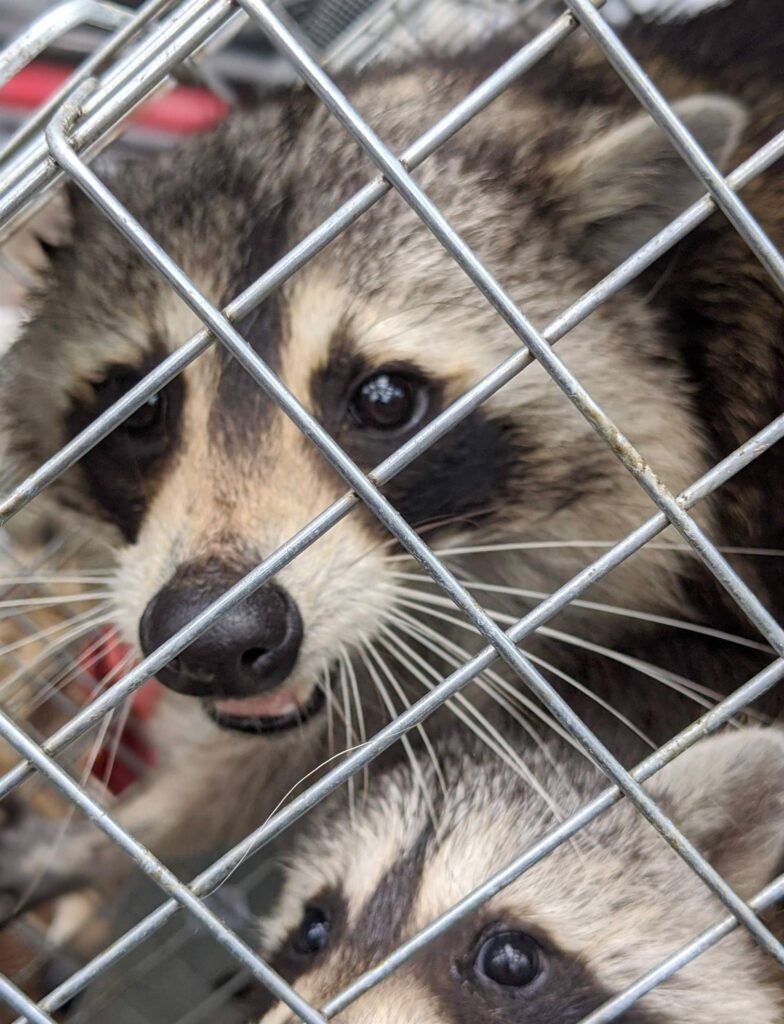
Raccoons have become one of the most common nuisance animals found all across the United States and in New Jersey, it is no different. Despite their unique appearance, raccoons can be real menaces to have around your home and property. Between the diseases they carry and the damage they cause, these are very harmful critters to have around. Continue reading to learn more about raccoons and how you can remove them.
Why are raccoons attracted to my property?
Raccoons are very curious animals, as they are always looking for an easy meal or a great shelter. Oftentimes, this is why they will pick a yard or home in particular. When there is a house with openings that allow easy access, raccoons will especially funnel in, as this will keep them warm and safe. In addition to shelter, raccoons desperately scavenge for food. Any pet food, trash, or fallen fruit from trees is an excellent invitation to raccoons to invade your yard.
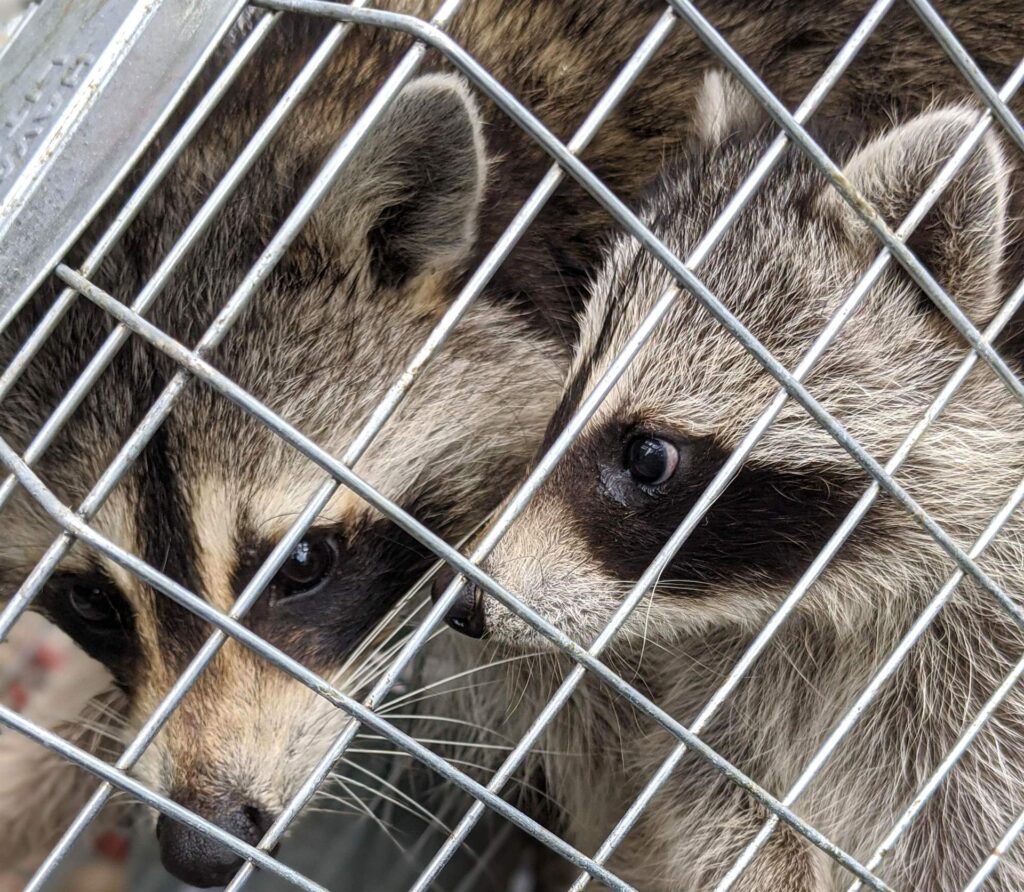
Why should I remove the raccoons?
Raccoons might seem pretty harmless, but their destructive nature and the illnesses they spread are very serious. The damage caused by raccoons can vary wildly. Sometimes, they love to make a mess of garbage cans or just cause big messes in general. Other times, raccoons will gnaw through wood and other materials to gain access into other areas of your house. If you have small pets, birds, or rabbits, be prepared for raccoons to ravage them and seriously harm or kill them. As can be seen, property damage is serious with these critters.
Even without the property damage aspect, raccoons are still not good creatures to have around your property. These animals carry raccoon roundworm, rabies, salmonella, E. coli, and a whole host of other potentially fatal viruses and bacteria. Since these illnesses can be spread through feces, urine, saliva, and even through bites or scratches, raccoons can be very harmful to human health. In the interest of protecting your family, yourself, your pets, and your home, removing raccoons should be a top priority.
How can I prevent raccoons?
Since raccoons can cause so much damage, you will likely want to prevent them from coming near your home and property. To keep them away, be sure to clean up your yard. Be sure any pet food and garbage are secure, always make sure to pick up any fallen fruit from trees, and always keep fowl and other small animals away from raccoons. When it comes to securing your home, be sure to inspect it very thoroughly as a first step. Once you have examined your home, fix any problem areas that you see. Once this is done, you should be safe from any raccoon invasions of your home and property.
How do I remove raccoons?
The removal of raccoons is a delicate process, despite what many commonly think. It seems easy enough to install a one-way door or set a cage trap, however, these are rarely very effective when performed by homeowners. This is because many times the raccoon will be a female who recently had her young in your home. If you remove the mother, the babies will be left alone to die slow, painful deaths, all the while creating nasty odors throughout your home. Compound this with the potential for contracting a variety of very harmful illnesses, and raccoon removal is no longer the easy, do-it-yourself task as many people think. This is the reason it is generally advised to hire a professional wildlife removal company.
Why hire New Jersey Wildlife & Pest Control?
Here at New Jersey Wildlife & Pest Control, we think outside the box, and we are highly effective at removing raccoons because of it. Depending on each unique situation, our experts will recommend a specific plan of action for your individual wishes and circumstances. In most cases, our experts will choose our patented process designed to get raccoons out and keep them out. Our experts will install an aluminum one-way tunnel that allows a way for the raccoons to leave your home, but will not allow them back in. However, if a raccoon needs to retrieve her young left inside, she can still gain access by using her “mommy strength” to get her offspring out with her.
If you have aggressive raccoons in your home or on your property, you can choose to have a New Jersey Wildlife & Pest Control expert trap and relocate the raccoons, keeping you, your family, your pets, and your community safer as a result. At New Jersey Wildlife & Pest Control, our focus is on the client. From start to finish in the pest removal and exclusion process, our clients are in control of what they want. We love providing a removal service that is founded on ethics, humane treatment of animals, and customer service. If you have a raccoon problem of any kind, be sure to give us a call at New Jersey Wildlife & Pest Control!
Request Free Quote
5 Important Steps to Get Raccoons Out of Your Attic
Hearing scratching, scurrying, and thumping in your walls is never an encouraging or exciting scenario to experience. Hearing something moving in your house means that an animal has made their way into your home and you will have to begin the process of removing it.
Any sort of animal has the ability to carry a significant amount of bacteria and disease. This disease and bacteria can be spread through direct contact with the animal or even through contact with their urine, feces, or the remnants of what they left behind in your space.
Raccoons are not uncommon and unfortunately can require one of the most involved processes of removal because of their size. They can also cause a significant amount of damage to your home or attic space because of their size and incessant chewing and destruction. Raccoons often find themselves in attics. Attics can be more difficult to remove depending on the size and how much access you have to the attic space. Some attics are difficult or dangerous to move around in and removing raccoons from the space can be incredibly difficult. There are several steps required in the removal of animals and New Jersey Wildlife & Pest Control can assist you with anyone that you need. Here is a typical and general list of steps needed to remove raccoons from your attics space:
Assess/Identify
The process must begin with assessing the severity of the situation. Confirming that you do, in fact, have raccoons in your attic is a great place to begin. A professional can come to your space to assess and confirm the type of animal that is present and how many there may be. It is also necessary to identify the access points that they used to make their way in and out of the attic. Locating this is important for steps that need to be completed later in the process.
Trap/Remove
Once the animals are located and you are aware of the number and type of animal that is present, the process of removal can begin. It is also beneficial to know whether there are any young present in the space. If so, they will need to be removed from the space first. They can then be used as a way to lure the mother out of the space. The adults can then be removed by whatever trap method you are choosing to use.
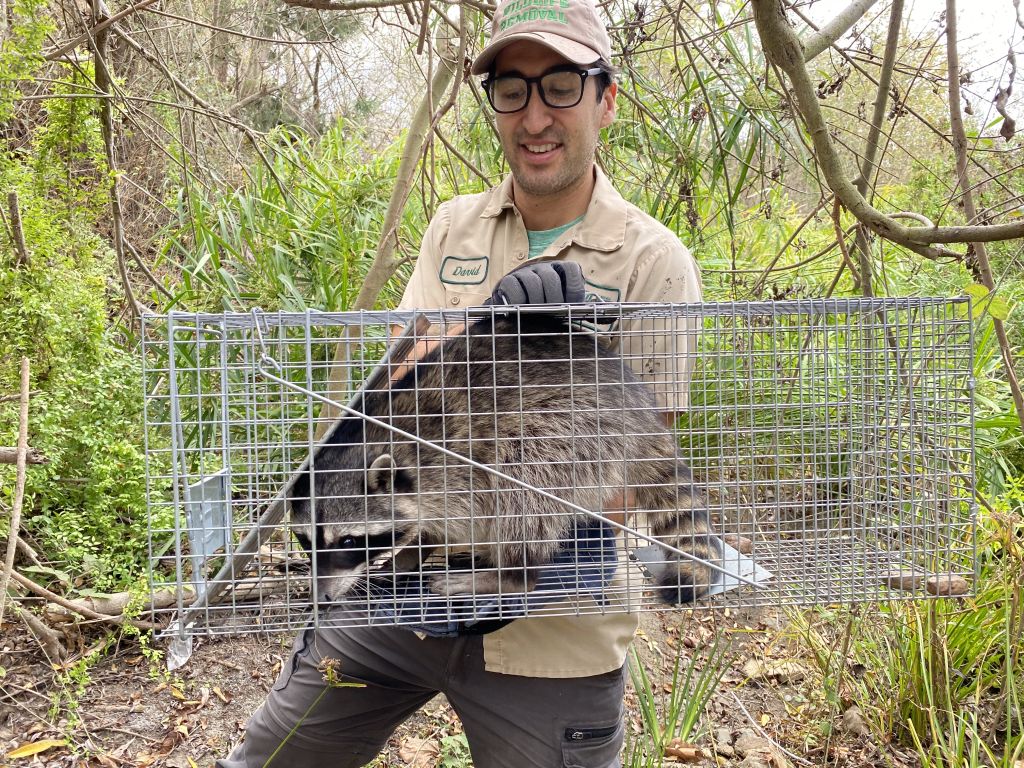
Sanitize
Depending on the size of the group of animals that were present in your space, you may have a significant amount of waste and trash to clean and sanitize. Even if there was only one raccoon currently present in the space, you will still need to thoroughly sanitize the space for your safety.
Repair
After the space has been thoroughly sanitized, you will then want to thoroughly repair any damage that has been done by the animals. There could have been damage done to insulation and foundational areas of the home that will be necessary to have completed by a professional. Repairing and closing up any holes or entry points used by the animals is necessary to keep further infestations from happening.
Prevention
All of these steps are methods of prevention. A thorough removal, sanitation, and repair are three simple ways to prevent further infestations. The key is making sure there is no further access and that your space is as unattractive to animals and raccoons as possible. Make sure there are no access points to the inside of your home and any access to food or water.
New Jersey Wildlife & Pest Control can help you with any step of the removal process that you may be on. We can help guide you, complete the task for you, and give you advice on how to move forward.
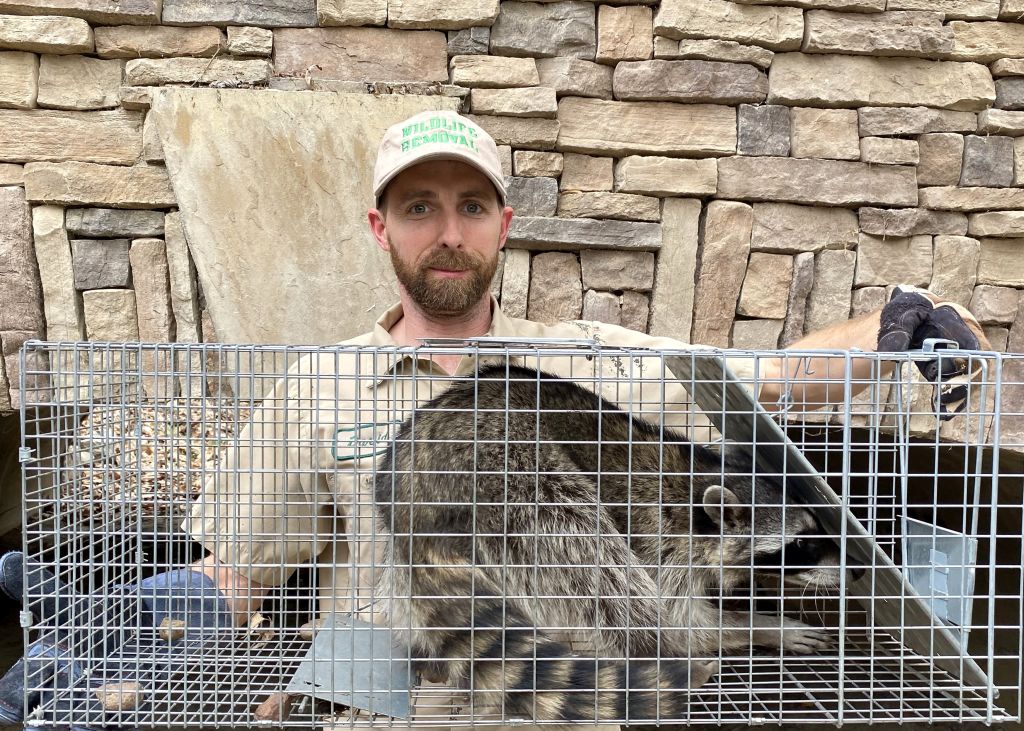
How to Keep Raccoons Out of My Garden?
Although raccoons might be best known for their attraction to the trash and the like, they’re equally likely to go after something more sophisticated, like a garden. Moreover, these relatively tiny creatures are omnivores, meaning they’re ready to eat virtually anything they get their hands on. So, if you’re unlucky enough to find raccoons in your garden, here’s how to keep raccoons out.
Cleaning Up
The easiest way to keep raccoons away is to remove what they want. Without any reason to enter your property, raccoons aren’t going to do so. However, while getting rid of what they’re looking for might seem simple, it’s not necessarily the same in practice.
Cleaning up doesn’t mean just picking up trash; it also means sealing trash cans, removing outside food, clearing water sources, and potentially relocating bits of your garden. Raccoons will actively seek out anything, meaning you’ll have to remove the trash, food, water, and even shelter outdoors.
If you have trees nearby, this may also mean cleaning up berries, nuts, fruits, insects, and more that come from or are also relative to trees. There’s a lot that can keep raccoons coming back, meaning that calling a local business like New Journey Pest Control is a good step towards solving your problem.
Preventing Re-Entry
Keeping raccoons from being able to come back to your garden can be both a first step and a second step. On top of obviously stopping raccoons from visiting your property, it’ll also keep things safer from other animals.
Securing a garden can mean removing attractants, like in the above step, while adding extra defenses like netting, mesh, moats, or more. Preventing re-entry envelops all of those ideas while also putting more in the way of a raccoon or other animal.
However, this is useful only after you find where things aren’t the most effective. Looking around, find open gaps, uncovered food, holes, shelters, or other issues. These are all potential issues that could make it hard to keep raccoons out of your garden. They’re also signs that the raccoons might be living on your property, in which case you might have to do a bit more than be proactive.
Taking Action
If you think there are raccoons actively on your property, then it’s worth looking into either contacting a pest control company like New Journey or investing in a cage trap. Cage traps are non-lethal, built to contain animals before being removed. While that’s great in concept, these traps don’t work exceedingly well with raccoons. That’s thanks to how often raccoon families (with babies) move their way into properties.
Raccoon families are incredibly hard to remove, especially since removing mothers separately from their children will lead to them dying. If you discover small crying noises or baby raccoons, immediately call animal control or a control company, as you most likely won’t be able to move them without killing at least one.
However, if your raccoon infestation results from a single raccoon or a group without any children, then things are different. After checking local laws, you can cage the animals before or after cleaning your property and adding proactive defenses. Of course, every situation is unique, so it’s vital to learn more about the situation before taking action. That’s why it’s recommended to first clear out trash, food, and water before securing your garden. Afterward, make sure that you’re dealing with a raccoon problem you can handle safely, taking the appropriate measures to keep yourself safe and safely capture and release the raccoons. In any case, there’s always the guaranteed help of having a professional do it for you, whether you’re worried or the problem’s too big to handle alone.
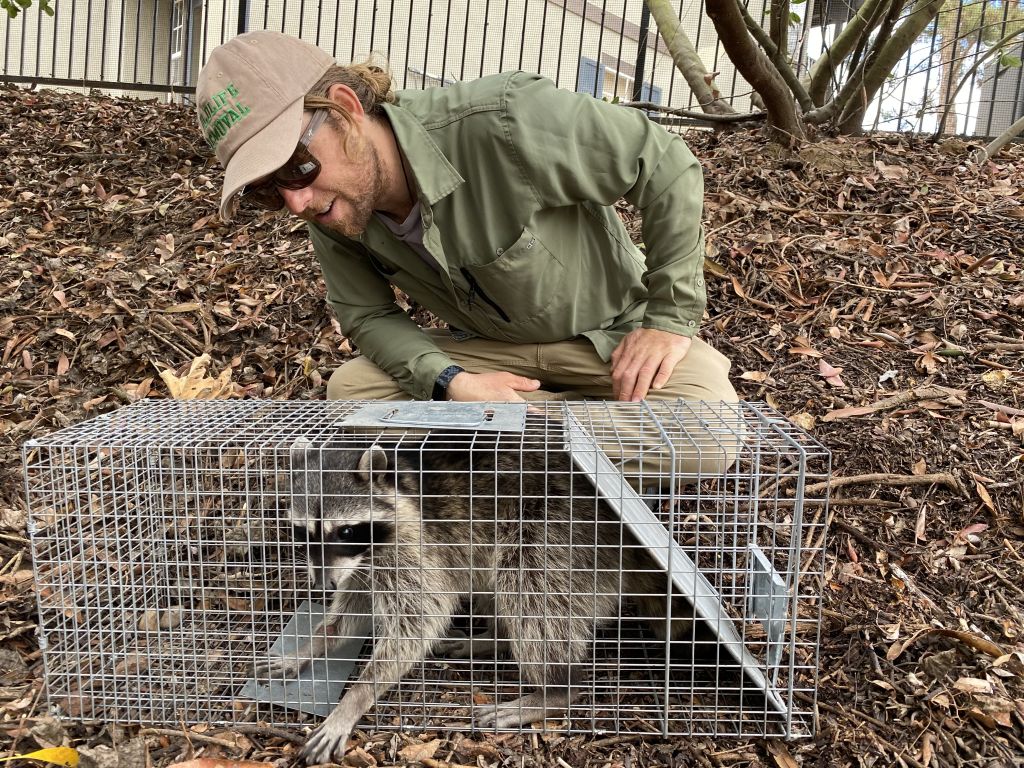
How to Keep Raccoons Away from Your Garbage Can?
Let’s face it; Raccoons are why we have to check the trash now and then. Scattered trash and unsightly surroundings are among the many pangs of a raccoon invasion.
If you live in an area “infest-able” by Raccoons, you should be prepared to properly treat your trash and Garbage cans. Here are some DIY methods to secure your trash bags from raccoon menace/anger;
- Secure the trash cans with strong locks
Raccoons are aggressive scavengers, they will eat anything they can find, and they search fiercely. The best way to protect your garbage can from its menace is to secure it properly with a lock or heavy metals placed above the covers.
- Make the Place irritable for them.
Raccoons have great trust in their sense of smell. Once they can smell it, they will try so hard to locate it. They don’t mind the level of destruction or mess they leave behind.
However, you can irritate their smell or other organs by placing Mothballs, Apple Cider Vinegar, or ammonia around the trash. Raccoons hate these smells and would rather chase other areas for food.
- Scare them off
Being nocturnal animals, Raccoons scavenge mostly at night. This also means that man-made noises or devices easily spook them. You can scare them off with motion-detection lights, sprinklers, or other sensors.
Installing lights that come on suddenly will greatly irritate/scare the Raccoon and lead them to consider other areas.
- Install a radio or speaker next to their favorite spot
Raccoons hate any spooky device or something that sounds like a human. Installing a tuned radio will scare the Raccoon of that area. Constantly playing the radio (human voices) around the garbage can or trash is a good way to scare them from the property.
If possible, you can even set up the radio to turn on at random times; it will increase the effectiveness of using the radio.
- Improve the fences around the trash can
If you keep your garbage Cans at the back or beside the fence, you should improve the facilities around the offense. You can add electric installation spikes atop the fence or make it difficult to climb the fence from such areas.
You should also clear any overhanging trees that lead into the fence/building. You can also move garbage cans from such a location and secure them in a locked area.
- Sprinkle Raccoon Repellents around the Garbage cans
Visit wildlife stores near you to get any synthetically made Raccoon repellents. You can also purchase waste bags that smell Raccoon repellents to pack the wastes. Other options are to get the scents of Raccoon predators like;
- Wolf urine,
- Naphthalene (active in mothballs)
However, you should be careful of using such products if you have pets.
- Spray Dusty powder or materials around the Trash
Raccoons hate to get dust or other slippery substances on their paws. The feel of such powders or substances will irritate them to seek other areas. You should sprinkle baby powders around the trash and on the garbage cans.
However, this may not be a permanent and effective solution to the Raccoon menace.
Wrapping Up
Some of these DIY methods have varying degrees of issues with applying them. For example, local laws in the area may prohibit the use of Mothballs or other repellents. Also, Raccoons being tireless Pests, may forge through any of the barriers you place around the garbage area.
The next best thing is to contact professional services like ours while keeping the areas around the trash clean> if Raccoons cannot smell it, they are hardly interested.
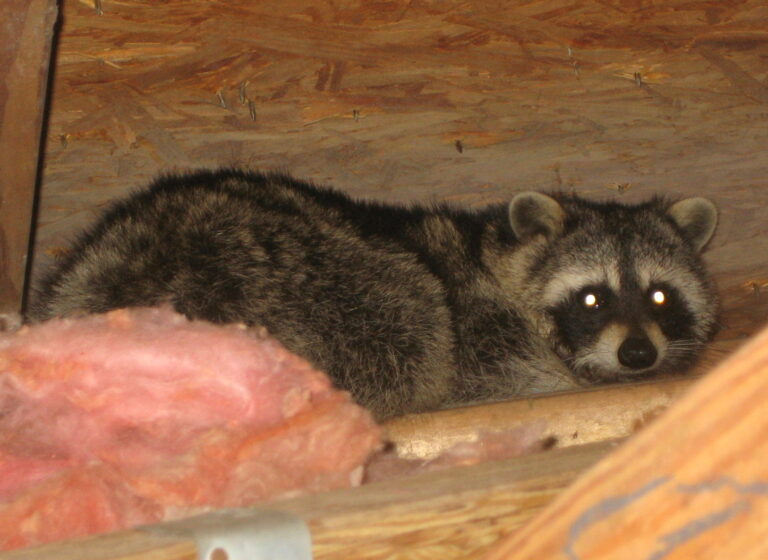
How to Remove Raccoons Under Porch
Raccoons can be found in urban and rural areas throughout the country, as they are able to survive in many different environments. This leads them to often have extensive human contact and can lead to problems with humans in many cases. Since raccoons are so harmful to human health and are very destructive, it is important to remove them quickly. Continue reading to learn more about how to remove raccoons under your porch.
Why are raccoons attracted to my yard?
More often than not, raccoons come to certain properties because they are looking for food and shelter. Yards that are abundant in food supplies, such as pet food, unsecured garbage, and even small animals, are very attractive to the opportunistic raccoon. When it comes to finding shelter, raccoons are always on the lookout for anywhere that is secluded, dry, and warm. This often leads them to make their way under porches, into attics, or in brush piles found around the property.
How harmful are raccoons?
Raccoons can be very detrimental to human health because of the diseases they commonly carry. Rabies, raccoon roundworm, and distemper are some common illnesses that can potentially be fatal for humans and pets. These diseases are often spread through contact with a raccoon’s droppings, urine, or saliva, or through a direct scratch or bite in some cases. Even if raccoons are not living in your attic or other parts of your home, they are still very much a threat to you, your family, and your pets.
If a raccoon is living under your porch, it is likely causing some harm to your porch, as well as looking for more ways to be destructive around your home. Often, raccoons will scratch and gnaw their way through many different materials including drywall, lumber, and even wiring. In addition, any raccoons living under your porch may try to find a way into your attic or other parts of your home or garage.
How can I prevent raccoons?
Preventing raccoons from getting under your porch really comes down to reducing the appeal of your property. To accomplish this, get rid of all easy food sources and shelter for the critters. Begin by simply securing your garbage and pet food, cleaning up any food scraps that could be laying about, and securing any small animals or fowl you have around your yard. When it comes to shelter, consider keeping weeds and grass trimmed short, picking up debris, and getting rid of any piles of wood, leaves, or debris you have around.
How should I remove raccoons?
Having raccoons under your porch is a unique situation, as they are not in your home, but they can still cause a lot of problems. Raccoons are very commonly caught and removed through the use of live cage traps that have bait in them. Simply setting the baited cage traps by their entrance under the porch should yield some of the critters. While it seems simple, some raccoons are too smart to fall for this method. This can lead to an exacerbation of the problem and additional risk for disease and damage. In addition, trying to remove the raccoons on your own can expose you and your family to the potential for disease.
For these reasons, it is highly recommended to hire a professional wildlife removal company to perform the removal for you. These experts have tons of experience in dealing with many different scenarios. In addition to providing removal services, these experts will also be able to repair damage caused by pests and they can perform exclusion services that keep out any nuisance wildlife in the future.
